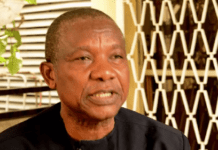For the recurrent mortality from the dreaded Lassa fever to be brought to a halt, Nigerians must awake from their carefree attitude to health care, and turn on their surveillance searchlight towards any persons, animals or environments, that are susceptible to the disease. This was the unanimous submission of scientists at a recent symposium on Lassa fever.
The experts, who converged at the conference hall of the Nigerian Institute of Medical Research (NIMR) on 25 April, 2016, to discuss the way forward on the virus include, Professor Innocent Ujah, DG NIMR; Dr. Oyewale Tomori, chairman, Lassa Fever Control and Prevention Committee; Professor Maurice Iwu, president, Bioresources Development Group, among others.

Addressing pressmen during the event, Tomori identified some gaps in our health care delivery system, which have paved way for the festering of the disease in the country, as far back as 1969, when the virus was first detected.
He said: “ The first thing is that we don’t care much about our health, if we think it is important, then there will be adequate surveillance and good diagnostics centres. These were in place sometimes ago, but because of our carefree attitude to health, the then government stopped funding them, and abandoned all those centres, and this has landed us where we are today. This indifference to health care is also evidenced in the current budget, where someone will expunge funds for polio and drugs for HIV”.
Still emphasising the need for sufficient observation of our environment, he said the issue of disease surveillance is of utmost importance because when a disease is discovered earlier, then it can be quickly treated before it degenerates beyond control. “We need good surveillance for early detection and control”, he stressed.
The Lassa Fever Committee Chairman, further asserted that there are candidate vaccines for trials, and Nigeria will be one of the most appropriate countries for the trials to be conducted, with the recent outbreak in the country. “So part of the proposal we are putting up is that we would ask the government to support Lassa fever vaccines trial in the country”, he noted.
Professor Iwu, in his own contribution mentioned systemic approach as a way forward in addressing disease outbreak in the country. He bemoaned the Nigerian health delivery system, saying that it’s unfortunate that a disease that was discovered 47 years ago could still be killing people in their numbers today, due to our apathy to sound health care.
“Henceforth, we don’t want to be reacting to issues, we want to treat issues holistically. What we intend to do from this meeting is to network, connect with one another, because nobody has all the solutions. But what is critical is that we have the manpower, intellect needed, resources needed to diagnose the disease”, he stated.
He also condemned Nigerians fire brigade approach to outbreaks, stating that this has created a gap in surveillance because its not being taken seriously. “We only react to outbreaks, but when there is no dramatic display, people go about their normal businesses, and say not my portion .But not my portion doesn’t happen in science, if it suppose to happen it happens”, he said.
In his address, the DG, NIMR, professor Ujah, explained the essence of the symposium, was for implementation, and not just a talk show. “We are not an emergency organisation; we look at things before they happen. We look at issues as they happen, how far they have gone, and how we can intervene. That is the whole essence of this workshop.
“Unfortunately, the case mortality of this year is the worst, and we want to know why, and proffer solution appropriately. No part of this country is spared of the disease, that is why we need to talk to stalk holders not only scientists. They should also participate, because, public health component of it is very important. Personal hygiene, environmental hygiene and our hand-washing culture should be sustained. Hand-washing has become a very important component, in the prevention of the disease”, he noted.
The NIMR boss didn’t neglect hospital practitioners in his enlightenment, adding that those working in the hospitals, already have what is called infectious prevention program, and they are taught on how to use skills and knowledge obtained thereof, in preventing infection in the course of service.
He also identified human capital as the most important factor, in combating the Lassa fever virus, stating that human capital is the best thing that can ever happen to any institute or organisation. “We need to have trained man-power, more virologists, we need to train and retrain lab scientists, and we believe that human capital is no one. Secondly, we need diagnostics, for accurate and timely diagnosis”.














buy medication without an rx pills without a doctor prescription
tadalafil pills 20mg: http://tadalafilonline20.com/ tadalafil online
tadalafil 10mg – tadalafil cheap tadalafil tadalafil tablets